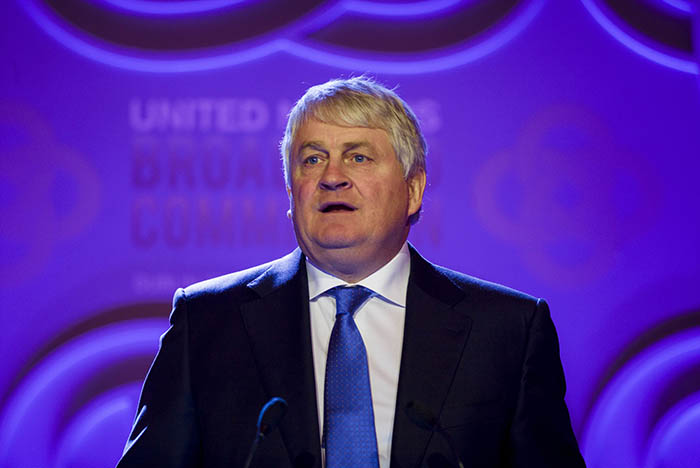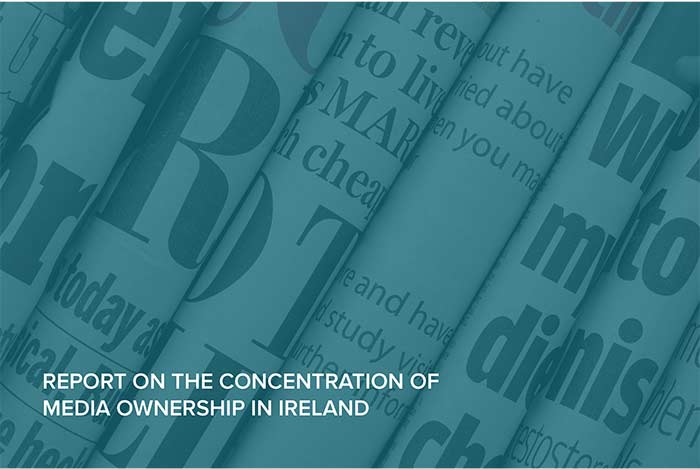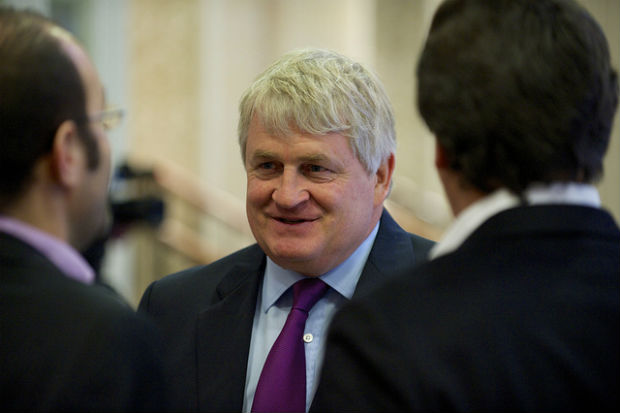16 Oct 2017 | Ireland, Mapping Media Freedom, Media Freedom, media freedom featured, News and features
[vc_row][vc_column][vc_column_text]

Denis O’Brien, the owner of Communicorp
Staff from the Irish Times will no longer appear on Ireland’s only two national commercial radio stations. The ban was laid out in a memo to Newstalk and Today FM staff on 5 October.
“The blacklisting of journalists in any context is deeply problematic but is more so in a media market that is as concentrated as Ireland’s. We call on the management of Communicorp to reverse this decision and support a plurality of voices,” Hannah Machlin, project manager for Mapping Media Freedom, said.
The memo of Communicorp’s radio outlets followed a 12 September 2017 commentary by Irish Times journalist Fintan O’Toole that criticised Newstalk presenter George Hook’s remarks about rape made on air on 9 September. O’Toole also took the station to task for its male-dominated lineup of presenters during prime hours, saying he would not appear on the Newstalk again as it had become “the most flagrantly sexist public organisation in Ireland”.
After the article and a social media campaign, Hook was suspended from Newstalk on 15 September.
Communicorp’s chief executive Adrian Serle said the decision to ban Irish Times journalists from Newstalk and Today FM programmes was made in response to O’Toole’s “vile comments”.
In response to the ban, the Broadcasting Authority of Ireland said it would “write to [the] Communicorp Group to clarify a number of matters in respect of editorial independence” in a statement to the Irish Times, along with the National Union of Journalists calling on Communicorp to reconsider its position.
O’Toole also tweeted he was “delighted” that Denis O’Brien, the owner of Communicorp, is “upholding free speech by banning all Irish Times journalists from all stations”.[/vc_column_text][/vc_column][/vc_row][vc_row][vc_column][vc_basic_grid post_type=”post” max_items=”12″ style=”load-more” items_per_page=”4″ element_width=”6″ grid_id=”vc_gid:1508149136704-f9f62e37-b6a5-5″ taxonomies=”76″][/vc_column][/vc_row]
10 Aug 2017 | Ireland, Mapping Media Freedom, Media Freedom, News and features
[vc_row][vc_column][vc_single_image image=”95135″ img_size=”full” alignment=”center”][vc_column_text]There’s considerable disagreement about how to tackle Ireland’s lack of plurality of media ownership. At the same time, there’s a growing pessimism that anything will change in the short term.
“There is no doubt we have a high concentration of media ownership in Ireland…that 45 to 50 percent of weekly newspapers – daily titles, plus weekends – are owned by one media organisation is unusual by any standards. Few other democracies exhibit this degree of concentration,” Dr Roderick Flynn, who focuses on media plurality at Dublin City University told Mapping Media Freedom.
Broadcasting in Ireland is dominated by the semi-state body, RTE. Its radio station, RTE Radio One, holds a clear majority of the most-listened-to shows. Its main TV station, RTE One, is equally dominant. The station also has a very significant presence online, and in addition, owns the Irish language station TG4. RTE received a license fee worth €178.9 million in 2015 but, significantly, the company also competes for advertising on all of its media platforms. However, it posted a €20 million loss last year.
In the commercial sector, the businessman Denis O’Brien plays a very significant role in the broadcasting and publishing landscape. He wholly owns Ireland’s largest commercial news radio stations – Newstalk and Today FM – through his Communicorp group. In addition, the company owns music radio stations such as Spin FM. O’Brien is also the largest shareholder in the Independent News and Media group. INM has full ownership of titles such as the Irish Independent, Sunday Independent, Herald, and Sunday World as well as holding a 50% stake in the Irish Daily Star. It also owns regional newspapers such as The Kerryman and The Sligo Champion. O’Brien’s stake in INM stands at 29.9%.
The National Union of Journalists has campaigned for decades for successive governments to legislate to ensure that media ownership in the country does not remain overly concentrated. However, the NUJ has little optimism that things are about to change. Acting general secretary Seamus Dooley summed-up the mood when he told MMF: “Irish politicians have shown cowardice in tackling issues of media ownership, so we would not be confident of reform in this area.”
This situation has had an impact on Ireland’s reputation. A 2017 report from Reporters Without Borders described media ownership in Ireland as “highly concentrated” and asserted that this posed “a major threat to press freedom.” Ireland has fallen from 9th to 14th place in the RWB standings.
A prominent member of the Irish parliament, Catherine Murphy, who is the co-founder of the Social Democrats party, told MMF: “I think the risks are considerable. The media needs to provide the public with a critical analysis on the major issues. When media ownership is concentrated in too few hands, then there is a danger of ‘group-think’ emerging. A practical example would have been the media coverage in advance of Ireland’s property crash.”
Earlier this year, Murphy introduced a private members bill on media ownership, however it was opposed by the coalition government. She is reserving her judgement on indications by the communications minister, Denis Naughten, that the issue will be tackled.
“I think there were some commitments given, and fine words too, but I would want to see the heads of a bill, or a memo going to cabinet, before I would take those commitments and words seriously. There is a laissez-faire approach often adopted by government. I’m afraid that it could all be lip-service”, Murphy said.
During the debate in parliament, Naughten, said: “I believe a strong and pluralistic media is at the heart of a free and open democracy.” However, he then said that the government would be opposing Murphy’s bill, partly on the basis that he believed that “… the current regime to assess media mergers is working well.”
Naughten also asserted that he was precluded by legislation from taking retrospective action because parliament “… has not provided for powers to retrospectively examine, review or intervene in past media mergers.” He argued that this could raise “significant constitutional issues” because it would be required to be balanced with the right to private property.
Ireland’s capacity to examine media mergers was due to be tested this year when Independent News and Media proposed acquiring Celtic Media – a move which would have increased the number of INM’s regional newspaper titles from 13 to 20. Under cross-media ownership regulations, the Broadcasting Authority of Ireland (BAI) was charged with conducting a review, after which the minister for communications would take a decision. However, the €4 million deal was called-off at the last minute – something welcomed by the NUJ which argued that such a merger would have “further undermined media diversity in Ireland.”
Dooley said that the government needs to take a holistic approach, given the plethora of problems facing Irish media – including the flight of advertising to online: “The NUJ has called for a commission on the future of the media in Ireland. This would look at the future of print, broadcasting and digital media. The issue of ownership would form part of the terms of reference. Yes – the industry faces challenges. And the impact of Facebook and Google cannot be understated.”
Other players in the Irish print media include The Irish Times, which is owned and controlled by a trust. Landmark Media controls another national newspaper, The Irish Examiner, as well as a number of regional titles and local radio stations. Landmark is owned by the Crosbie family. The news media giant, News Corp, owns the Irish edition of the Sunday Times, The Irish Sun, and the print-online The Times of Ireland. News Corp also owns several regional radio stations. The Irish Daily Mail is a division of the UK parent company.
The newest broadcasting entrant to the Irish market is the communications giant Liberty Global, which purchased the independent television network TV3. Subsequently, Liberty absorbed the ill-fated station, UTV Ireland, and its financial power has seen TV3 outbid RTE for sports rights.
Given the current situation, the NUJ is very concerned about the capacity of the public to access quality journalism on the major issues of the day. Seamus Dooley told MMF: “Owners seldom directly intervene to influence content. But corporate policies shape news, content and help influence views. So if the emphasis is on maximising profit, at the expense of editorial investment, then that has a significant impact.”
Flynn of DCU has conducted considerable research into this issue. In 2016, he wrote the report Media Pluralism Monitor Ireland and presented the data at a conference in Dublin in 2017 organised by the European Centre for Peace and Media Freedom. He told MMF: “A point that goes slightly under the radar is that as well as owning the two biggest independent radio stations in the country – Newstalk and Today FM – Denis O’Brien’s Communicorp group also owns the Dublin stations 98FM and Spin 103.8. While RTE still accounts for 43% of the County Dublin market as a whole, this drops to 11.2% amongst the 15-24 year olds. By contrast, JNLR listenership figures released in July 2017 suggest that Communicorp-owned stations accounted for more than 52% of the market share in Dublin.”
According to Flynn, the problem is not limited to Dublin. “Newstalk’s so-called ‘rip-and-read’ news service is now used for national and international news bulletins by all regional radio stations in Ireland. That’s another example of the concentration of media ownership here,” he said.[/vc_column_text][/vc_column][/vc_row][vc_row][vc_column][vc_basic_grid post_type=”post” max_items=”12″ style=”load-more” items_per_page=”4″ element_width=”6″ grid_id=”vc_gid:1517486798990-b483150f-f681-9″ taxonomies=”6564″][/vc_column][/vc_row][vc_row][vc_column][vc_column_text]
Mapping Media Freedom
Click on the bubbles to view reports or double-click to zoom in on specific regions. The full site can be accessed at https://mappingmediafreedom.org/[/vc_column_text][/vc_column][/vc_row]
10 Nov 2016 | Ireland, Mapping Media Freedom, News and features
[vc_row][vc_column][vc_column_text]
The Republic of Ireland has seen a steady decline in media plurality, according to the authors of a new report.
The recent Report on the Concentration of Media Ownership in Ireland, published on 19 October, concludes that the country has one of the most concentrated media markets, with wealthy media owners possessing the influence to skew the news report for personal gain. According to the report the The authors — Caoilionn Gallagher and Jonathan Price at Doughty Street Chambers, Gavin Booth and Darragh Mackin at KRW Law, and commissioned by Lynn Boylan MEP– drew on a variety of studies to compile the report including research from the Centre for Media Pluralism and Media Freedom’s Media Pluralism Monitor (2015). Based on the source material, the report examined how diversity in viewpoints and opinions are reflected in a nation’s media content.
CMPF created a Media Pluralism Monitor to measure whether a country is a “high risk territory” on a scale of 0% to 100%, with “high risk” countries falling at 74% or above. Researchers based in the 19 countries covered by the monitor collect data points that include protection of journalists, number of media outlets, political independence and social inclusiveness among other indicators.
In 2015 Dr. Roderick Flynn, of Dublin City University, generated a report on Ireland for CMPF’s Media Pluralism Monitor which found there was a “medium risk” (54%) of market plurality, and specifically “very high risk” (74%) in relation to the “concentration of media ownership”. Based on Flynn’s research it was concluded that, largely, the media concentration stemmed from businessman Denis O’Brien, founder of Communicorp, owner of a significant minority stake in Independent News and Media and a large portion of the commercial radio sector. The October report called O’Brien’s ownership and influence in media outlets a concern. Additionally, Doughty Street Chambers and KRW Law highlighted the Irish defamation law as a key issue “which threatens news plurality and undermines the media’s ability to perform its watchdog function”.
Though Flynn’s study and the Doughty Street Chambers and KRW Law report clearly point out significant issues, which have been further discussed with organisations such as the National Union of Journalists and the EU Commission, it also proposes ideas for revisions. The report states the “firm view that there must be detailed multi-disciplinary analysis and careful consideration before any steps are taken”. The authors of the report suggest that the Irish should “establish a cross-disciplinary commission of inquiry”, which would “examine the issues closely and make concrete recommendations.” Additionally the authors ask the Council of European Committee of Experts on Media Pluralism and Transparency of Media Ownership to work within the parameters of the European Convention on Human Rights (ECHR), a treaty that “the right to [business] property is heavily caveated under”. Consequently, by utilising the ECHR, the committee could spur a decrease in the media power of business moguls such as Denis O’Brien. Along with further modifications, the study indicates that these alterations are necessary to maintain media plurality in Ireland.[/vc_column_text][/vc_column][/vc_row][vc_row][vc_column][vc_basic_grid post_type=”post” max_items=”4″ element_width=”6″ grid_id=”vc_gid:1479382383515-ed0923d1-1fb7-1″ taxonomies=”76″][/vc_column][/vc_row]
14 Aug 2015 | Ireland, mobile, News and features
Denis O’Brien, Ireland’s richest media mogul and owner of the country’s largest newspaper group, had a satire malfunction last week when his solicitors, Meaghers, pursued up-and-coming satirical website Waterford Whispers.
The site, known as WWN, had published a fictional story about a parallel universe in which the tycoon had been convicted of white collar crime. The editors soon received a letter stating that “references to a ‘parallel universe’ are a sham”, and that the lawyers had instructions to take “all necessary steps to vindicate their client’s good name and reputation.”
Scary stuff for a fledgling operation. Editor Colm Williamson, faced with the wrath of O’Brien, understandably took the post down.
Then, political site Broadsheet.ie reported the threat to Waterford Whispers, including a screengrab of the original article. So, they, too, got a letter from Meaghers, as did their web hosting company, hostingireland.ie.
For all that, it would be wrong to characterise this as simply a rich and powerful man going after innocent upstart startups. That would be to denigrate O’Brien unfairly. For he is equally at home pursuing the parliament and the national broadcaster as he is pursuing people who write jokes.
As previously reported by this column, O’Brien took umbrage when an independent TD, Catherine Murphy, raised allegations over his business finances in the chamber of the Dáil. O’Brien got an injunction against RTE, the state broadcaster, from reporting the comments, in spite of the fact that, as Murphy enjoyed parliamentary privilege, her comments were available on the Oireachtas (parliament) website.
The Dáil’s Committee on Procedure and Privileges subsequently found that Murphy had not abused her parliamentary privilege, and that it could not rule on the veracity of her comments.
It emerged earlier this month that O’Brien is taking legal action against the committee protesting that decision. He is also taking legal action against the state: He is suing the country over comments made in parliament. Where the hell does satire go from here?
The answer is that satire has never had the most comfortable existence in Ireland, in spite of all our Swifts and Wildes and Becketts and O’Briens.
While we may be a people noted for our sense of humour, we’re deadly serious when it comes to ourselves. O’Brien, a man richer than Oprah, or Donald Trump for that matter, portrays himself throughout these proceedings as the innocent assailed on all sides. He is a citizen making a stand for all that is good and holy in a wicked world.
He, a decent man, a patriot no less, a man who volunteered to pay the wages of the national football team, is assailed by gombeens, ingrates and begrudgers who will do everything in their power to keep a good man down. These forces may take the form of the state or a small website. It doesn’t matter. What matters is there are external forces trying to destroy us. It’s probably a post-colonial thing. We can usually blame that.
But whatever the psychology behind it, O’Brien has engaged a scattergun assault on free speech. It’s fascinating to watch, as he turns one Waterford Whispers spoof story into a near-prophecy.
“Denis O’Brien To Sue Everyone”, read one Waterford Whispers headline in May of this year. “We’re particularly targeting people who have had negative thoughts about Denis in their head but have never uttered them in a public forum,” a fake solicitor was fictitiously quoted as saying in the entirely made up story.
And now? Well we haven’t reached that stage yet, but being honest, one does think twice about writing about Denis O’Brien. And this is only vague trepidation about covering publicly known libel threats. One wonders if editors on struggling titles will really have the stomach for sending a hack out to do some serious muckraking. That is not to suggest that anything will be found — simply that you don’t know until you look. That’s how journalism works.
That O’Brien makes a large part of his money from newspapers, radio and mobile phone communications bears repeating. The free exchange of information is his business. Perhaps he should show a little more respect to the principle and the practice.
This column was posted on 14 August 2015 at indexoncensorship.org



